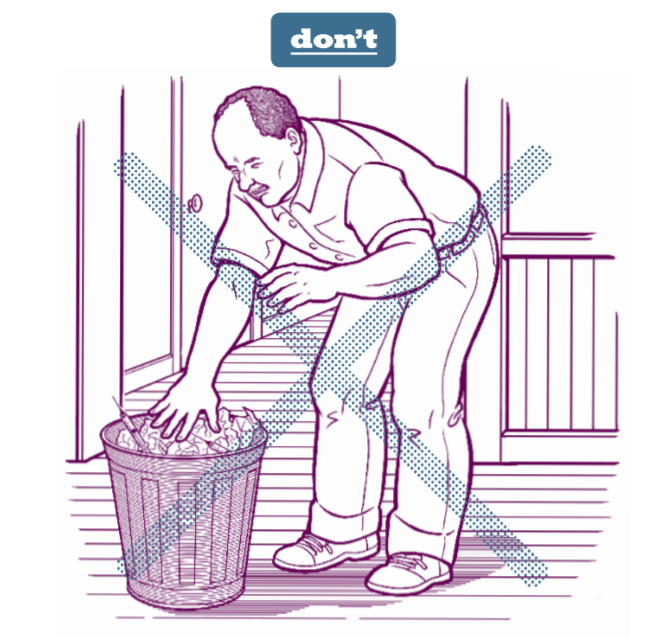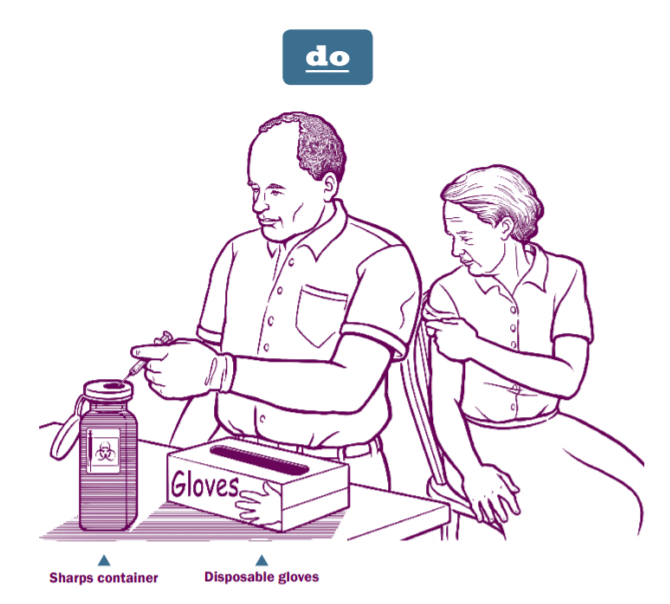When handling needles and sharps, watch out for contact with blood and body fluid. They can be infected with disease. Diseases carried in blood include HIV, the virus that causes AIDS, and hepatitis B and C, which are incurable liver diseases.


You are at risk for HIV/AIDS, hepatitis, and other diseases if you
- Are stuck by a needle or “sharp” (an object that can pierce your skin) that has infected blood on it. It could be a needle that you are using for an injection, a diabetes stick, a discarded needle that accidentally sticks you when you are cleaning up trash, a razor, or a piece of broken glass.
- Are splashed in the eyes with infected blood.
- Touch infected blood when you have a cut, open sore, or broken skin.
Clients may also be at risk of getting an infectious disease from homecare workers.
Tools
Use these things to make this work safer:
- Disposable gloves.
- A sharps container for throwing away used needles or other sharps.
Tips
- If you get a needle stick or a cut from a sharp, wash the area with soap and water. If the contact is with your nose, mouth, or skin, flush with water. If it is with your eyes, rinse them with clean water or saline. Contact your doctor as soon as you can.
- If you work for an agency or company, immediately report this accident to your employer.
Standard Precautions
You can’t tell if people are infected with HIV or hepatitis B just by looking at them. Using “Standard Precautions” means protecting yourself as if all blood and body fluids are infected. Use Standard Precautions whenever there is a chance of contact with blood or body fluids, including during tasks such as bathing, wound care, laundry, and toileting.
- Wear disposable gloves every time you may be in contact with blood or body fluids. Ask the client about skin allergies to specific products. Use special gloves if either of you is allergic to latex or vinyl.
- Make sure the gloves fit. Replace them if they get torn or damaged.
- Use new gloves for each new client and each new task. NEVER reuse disposable gloves. Throw away used gloves.
- Wash your hands before you put on gloves and after you take them off. NEVER touch your mouth or eyes while wearing used gloves.
- Turn gloves inside out when removing them. Put them in a plastic bag and tie the bag for disposal.
- Wash your hands often.
- Wash with soap and running water at regular times during your work.
- Remove any blood or body waste from your skin or the client’s skin by washing with soap and running water.
- Handle sharps with extreme care.
- Point sharps away from your body and discard them immediately after use into a sharps container. Never put sharps in a regular recycling bin or trash can.
- Never reach into a trash bag! It could contain needles or other sharps.
- Never recap a needle or touch the point.
- Cover cuts, sores, or breaks in your skin and the client’s skin with bandages, unless the doctor says otherwise.
- Use bleach to carefully clean household surfaces that may have blood or body fluids on them. Mix one part bleach to 10 parts water. Make this solution fresh each day—and label it.
- Get a vaccination to protect you from Hepatitis B (See find help section, below).
Talk it over
You could say this: “I always use gloves when I help clients take their blood sugar test (or another task that could expose you to infection). As homecare workers, we have to be very careful to protect ourselves from serious problems.”
Please check out How Caregiver and Client Should Talk to Each Other About Safety for related tips for effectively communicating your concerns to each other.
Find help
- Disposable gloves are available at grocery stores, drugstores, and medical supply stores.
- Check with your doctor or clinic about getting a Hepatitis B vaccination.
- If you work for an agency or company, ask your employer to arrange for free and confidential hepatitis B vaccinations and flu vaccinations from an independent health care provider. If you are in a union, ask your union to arrange this. If you don’t have health insurance, call your city or county health department to find out where you can get vaccinated.
- To get a sharps container, contact your medical provider, drugstore, or medical supply store.
- Ask them how to properly dispose of the used container.
To do list
Supplies needed:
- Disposable gloves
- Sharps container
- Bandages
- Bleach
- Other: __________________________________________
Safety tips you will follow/New ways to do the tasks:
_____________________________________________________________________
_____________________________________________________________________
_____________________________________________________________________
_____________________________________________________________________
Issues you need to discuss:
_____________________________________________________________________
_____________________________________________________________________
_____________________________________________________________________
_____________________________________________________________________
People or organizations to contact for help, tools, or information:
_____________________________________________________________________
_____________________________________________________________________
_____________________________________________________________________
_____________________________________________________________________
Building on the above to do list, you can combine them with other to do lists from the other tips in this series to create your own combined action plan for safety and keep it on hand to remind you both about staying safe.
Reference: “Caring for Yourself While Caring for Others” by Center for Disease Control’s National Institute for Occupational Safety and Health (NIOSH).
* * * * *
Is caring your calling? We’re hiring qualified people committed to helping others. We serve clients in Contra Costa and Alameda Counties, mainly in Danville, Blackhawk, San Ramon, Dublin, Pleasanton, Castro Valley, Hayward, Livermore, and communities along the 680 Corridor of the East Bay. Learn more here.
You may submit an application here.